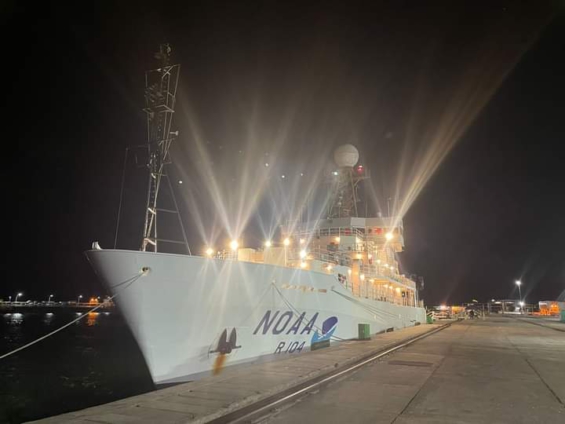A team of scientists aboard the NOAA Ship Ronald H. Brown has set sail from Suape, Brazil, for a 55-day voyage to the northerly waters of Reykjavik, Iceland, to collect data to answer critical questions about changes in ocean circulation and the ocean's uptake of human-emitted carbon dioxide.
Scientists will look into how global warming affects the movement of ocean water and how it affects the climate, particularly in critical areas like the North Atlantic.
The cruise will also focus on characterizing ocean life's responses to ongoing climate change.
With 150 planned stops along the A16N cruise route, measurements of heat, freshwater, carbon, oxygen, and nutrients will be taken from the ocean's surface to the seafloor, reaching depths of more than 5,000 meters (3.1 miles) in some cases.
For the first time on the A16N cruise, scientists will collect a variety of biological measurements, including environmental DNA samples.
However, this is not the first time such a comprehensive snapshot of the Atlantic Ocean basin has been made. A team of scientists has embarked on this cruise track every 10 years for the past 30 years with the goal of understanding long-term trends in the health and functioning of our oceans.
These research cruises are part of a larger international project known as the Global Ocean Ship-based Hydrographic Investigations Program (GO-SHIP), which makes repeat ocean observations at decadal intervals through a global network of cruise tracks.
The Atlantic is the only ocean basin where we see widespread changes in three fundamental nutrients required for ocean life growth: nitrogen, phosphorus, and iron are seen.
The availability of such basic nutrients shapes the diversity, distribution, and functioning of marine life and biogeochemical cycles in the Atlantic in a unique way.
The cruise's data will be used to track the biological changes in the Atlantic Ocean and to gain a better understanding of the diverse life that lives there.
"GO-SHIP cruises serve as a critical platform for testing, launching, and calibrating ocean observing technologies. In addition to collecting water samples, scientists on A16N will deploy up to 18 robotic Argo floats, including floats capable of measuring ocean biogeochemistry and the deep ocean, and up to 40 drifters as a part of NOAA’s Global Drifter Program. These autonomous floats and drifters will significantly expand the number of ocean measurements collected long after A16N is finished," a statement on NOAA's website said.
The statement added that, "the cruise will bring together 45 researchers from 15 institutions to take measurements of the highest accuracy, test new instrumentation, and work towards improving our understanding and modeling of the ocean environment."
According to NOAA, the A16N cruise will also be the last scientific voyage for the NOAA Ship Ronald H. Brown for a year and a half, as it is scheduled for dry-docking and repairs, as well as the first NOAA GO-SHIP mission since 2018. We wish the participants a safe and enjoyable journey!
"This research is made possible by scientists at NOAA’s Atlantic Oceanographic and Meteorological and Pacific Marine Environmental Labs, and academic partners with financial support from NOAA’s Global Ocean Monitoring and Observing Program and the National Science Foundation," the statement said.
"We wish the participants a safe and rewarding voyage," it stated.
Latest Stories
-
Police foil armed robbery attempt in Accra, two suspects killed
14 minutes -
PURC forces reconnection, resolves water utility dispute in Tamale
16 minutes -
Parliament passes Ghana Medical Trust Fund Bill
30 minutes -
Chinese firms explore opportunities under Ghana’s 24- Hour Economy programme
36 minutes -
Dr Zanetor Agyeman-Rawlings joins Ghana’s delegation to Pan African Parliament
40 minutes -
Forum in Mali sparks debate on Africa’s historical claims for reparations
41 minutes -
Northern Region: PURC resolves consumer utility concerns with innovative outreach programmes
42 minutes -
Ghana likely to end 2025 with inflation rate in single digit – Deloitte
42 minutes -
German Development Cooperation marks milestone in boosting digital job prospects for Ghanaian youth
44 minutes -
Kofi A. Tawiah Foundation to host character education training for educators in northern Ghana
44 minutes -
Newmont completes GH₵ 95m Hwidiem–Kenyasi road; commits $34m to boost Ahafo South infrastructure
52 minutes -
Three poachers arrested in Ankasa Conservation area after failed bribery attempt
60 minutes -
Sekondi court grants bail in 12-year-old assault case
1 hour -
ConShip joins line-up for JoySports Invitational Tournament 2025
1 hour -
Apple set to stave off daily fines, EU to accept App Store changes, sources say
1 hour

